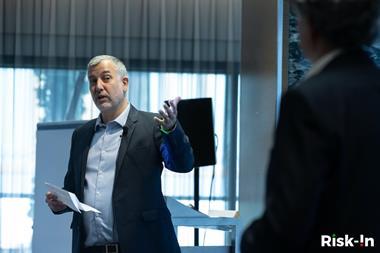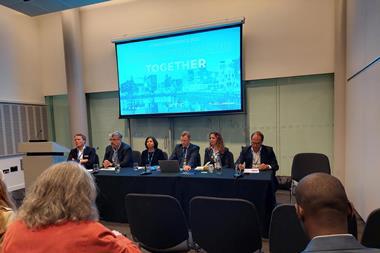AXA XL’s Sean McGovern explains how insurers can stay relevant and best support clients through the current turmoil
Q. The theme of the Airmic Conference 2022 is Moving Forward Together. What does that mean for you?
A. The last two to three years has been extraordinary in terms of what’s happened in the world. We’ve had extreme weather events, which appear to becoming more extreme and more frequent. We’ve also had the global pandemic and more recently, the conflict in Europe, which people just didn’t anticipate would happen in their lifetime.
That’s an extraordinary backdrop for a conference that’s focused on the risk industry. The conflict in Europe is really challenging the economic and geopolitical environment as well and this is creating huge challenge for society, for our clients and for the industry. You put all that together and the future looks very uncertain.
So now is a really good moment for the industry to come together to look at ways in which we can help our clients manage the impact of of what’s happened and what is still to come? For me is captured by the theme, ’Moving forward together’.
Whether it’s the impact of climate, the war in Europe or the pandemic - none of these are challenges any one of us can tackle by ourselves. Therefore we need to put our collective brains to work and pull in the same direction to manage the risks associated with these crises while still managing to drive our businesses forward?
That’s why these conferences are so important because they are rare occasions to share ideas and concerns, to challenge each other on what more we can do. I’m really excited by it and there’s a lot to discuss. There’s nothing like an in-person conference to create that concentration of dialogue.
Q. What are some of the risk management lessons from the global shocks of the past two to three years?
What we’re learning is that we need to be more agile and proactive in how we think about risk. If you think about COVID and Ukraine, arguably you’ve had two Black Swan events happening in very quick succession, in addition to the growing challenge that we’ve seen from climate change over the last few years.
The risk environment has become a lot more dynamic. It feels like it’s changing more quickly than in the past and is more unstable in its features. So it’s about recognising that we need to challenge ourselves about the way we view risk.
If you take a pandemic, for example, I would imagine for most of our clients, pandemic was somewhere on their risk register. It was on government risk registers too, but nobody thought it would be so global because of our previous experience with pandemics like SARS.
We need to get more uncomfortable challenging ourselves around the norms of how we think about risk, and that comes through greater levels of dialogue. Risk professionals need to be aware that emerging risks become real risks very quickly and without much notice.
Being prepared and anticipating emerging risk is going to be critically important, because whilst most companies had pandemic on their risk registers, how many would say they were truly ready to deal with something on that scale?
Some companies were very adaptable and very resilient in how they dealt with it. But others were left somewhat flat footed from the outset.
Q. How do you maintain the right level of preparedness needed when resilience fatigue sets in?
Tiredness can’t be underestimated, and you can be too focused on managing today’s issues and not keeping one eye on the horizon. There’s no substitute for going out and sharing experiences and perspectives with others.
There is a role for the industry to continue being the early warning system. If we as insurance risk professionals don’t become more forward-looking ourselves, how we can serve our clients in the way that they need to be served?
Research, continuously learning, helping clients see the risks that are emerging that could come at them quite quickly is all part of our role as a risk partner.
Q. It has been a challenging commercial insurance market for the past few years. How should buyers be approaching the next renewals?
There is no substitute for building our relationship with our clients and building that understanding. Difficult risks can be underwritten as long as there’s a full understanding about the way in which those risks are approached by the insurance industry.
Insurers are seeking to provide solutions to their clients - maybe not in exactly the way that a client wants it - but hopefully a solution will be reached through the right level of understanding, engagement and importantly, the trust that is built up between insurers and their clients through the ability to interact face-to-face.
At the end of the day insurance is is an industry that is based on utmost good faith and trust. The ability to get together to continue to build the relationships, to forge new relationships, just increases understanding and can only help facilitate successful renewals and successful placements of risk.
Q. How does the insurance industry need to innovate to better serve its clients?
A. People jump into innovation without really understanding what question they’re trying to answer, because innovation isn’t just about product development. Innovation is as much about preventing and mitigating risk, as it is about ultimately providing risk products, because what we’re all trying to achieve - what our clients are trying to achieve, what society wants and what we want as insurers - is better resilience, fewer claims and fewer bad things happening.
That’s why research is really important because it will drive innovation in the way in which clients and insurers can partner together to take the right resilience and mitigation steps, and also provide products as part of an overall framework.
Ultimately product innovation is going to become increasingly difficult and more complex. Because the insurance market is traditionally very good at managing tangible risks. Things you can see, which you can assess and monitor, and of course business and economy is migrating significantly towards intangibles as a driver of shareholder value. So it does call into question the relevance of the insurance industry.
Q. So how does the industry stay relevant?
A. This is where the London Market has a role with its reputation for being at the frontier of risk development and driving innovation within the industry and being an innovator in the risk space. An area of innovation we’re particularly focused on at the moment relates to climate, which is so important because it comes up in all of our conversations with clients.
We believe that the insurance industry has a very important role to play in driving greater levels of resilience and supporting clients as they transition to net zero. There has been lots of global commitments made at government level, but also by individual companies and insurers around a commitment to transition to Net Zero by 2050.
It’s a massive task which is going to require huge amounts of public and private investment for that transition to happen at that pace, including the harnessing and use of new technology.
That is going to create risk in and of itself. For an insurer, the development of new technology to support the climate transition, without historical claims data, creates challenges around pricing and underwriting. The subscription market in London lends itself to that sort of experimentation with new technologies and new risks, because it is a huge ecosystem of risk expertise across carriers, brokers other professionals.
That ecosystem really has an opportunity to innovate in that climate transition space to develop products and services that will help drive that transition.
So the insurance industry is massive as a facilitator of the transition, but it’s going to have to find a way to get comfortable insuring that new technology, which comes back to the importance of research.
Because unless you can really understand the question you’re trying to answer and the risks associated, you can’t take those necessary steps to innovate.
Sean McGovern is chief executive of AXA XL, UK and Lloyd’s
Airmic 2022: Brace for turbulence ahead
- 1
- 2
- 3
- 4
 Currently reading
Currently readingAirmic 2022: Facing a more ‘unstable’ risk landscape
- 5
























No comments yet